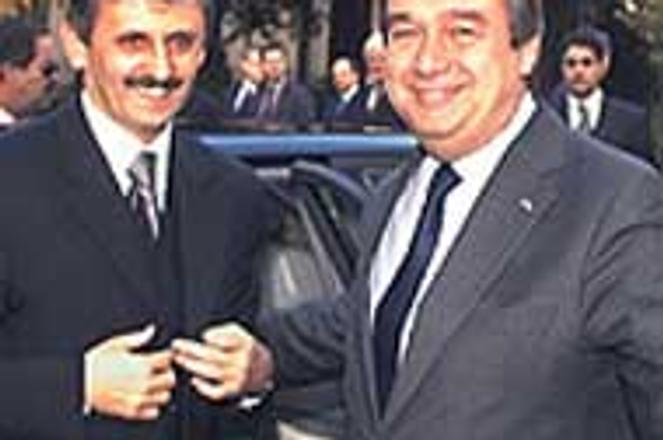'Prime Minister Dzurinda basks in the approval of Portugal's Guterres.photo: TASR
As Slovakia geared up to receive a verdict on its EU membership plans in Helsinki on December 11, the country's officials were leaving nothing to chance, engaging in a last minute flurry of diplomatic visits and exchanges designed to cement support among EU member nations.
Prime Minister Mikuláš Dzurinda paid a December 3 visit to Portuguese Prime Minister Antonio Guterres and Portuguese President Jorge Sampaio. Portugal holds the EU Presidency for the first half of the year 2000, and if the Council of Europe decides in Helsinki to begin EU membership talks with Slovakia, as is widely expected, Portugal's leadership will be crucial in deciding how soon these entry talks begin.
Following the meeting with Guterres, Dzurinda declared that "today, in Lisbon, our diplomatic activities leading up to Helsinki reached their peak."
Slovak officials also made a last-ditch effort to patch up diplomatic relations with Austria, which had earlier threatened to block Slovakia's EU bid if the country's aging Jaslovské Bohunice nuclear reactors were not shut down earlier than planned.
Austrian Chancellor Viktor Klima on November 30 offered to set up a special EU 'closure fund' to help Slovakia cover the costs of decommissioning Jaslovské Bohunice earlier than the 2006-2008 date the Slovaks had set.
Slovak Foreign Minister Eduard Kukan, for his part, sent Austrian Foreign Minister Schussel a letter on December 4 saying that Slovakia was prepared to negotiate the closure date with its neighbour "if new sources of financial compensation were found." The letter was regarded as a timely diplomatic gesture allowing the Austrians to support Slovakia in Helsinki without losing face.
Even Slovak President Rudolf Schuster got in on the act, presiding over a brief December 3 meeting of the presidents of the Visegrad 4 countries (Slovakia, the Czech Republic, Hungary and Poland) in the High Tatra mountains. The meeting had been called in support of Slovakia's EU candidacy; the other three countries began negotiations on EU entry in April, 1998.
And for anyone who remained unconvinced of Slovakia's place in an enlarged EU, a full page ad in the December 4-10 edition of The Economist magazine stated the country's case, with liberal references to an October 13 report produced by the European Commission recommending that Slovakia be invited to begin EU negotiations in Helsinki.
"We have done our best," Dzurinda said on December 8. "Slovakia's integration has been of the utmost importance over the last year."
As the Slovak Prime Minister boarded an airplane for Helsinki on December 9, he received a final boost from EC Chairman Romano Prodi, who declared that not only Slovakia, but also Latvia, Lithuania, Malta, Bulgaria and Romania would be invited to begin entry talks in Helsinki.
The six applicants will join six other countries already holding membership talks - Poland, Hungary, the Czech Republic, Slovenia, Estonia and Cyprus. As the summit approached, speculation mounted that Turkey might also win promotion to candidate status; however, this depended on whether its arch rival Greece could be won round before the Helsinki summit begins.
"We have not made up our mind," Greek Foreign Minister George Papandreou said on December 6. "We have not said yes, we have not said no. It depends very much on what the (EU) Council will decide."
Questions that remained unanswered included both the timing of the first EU admissions and the scope of negotiations with new candidates. According to foreign policy analysts, the EU was expected to adopt a 'regatta model' for entry, in which each of the 12 candidate countries would hold EU negotiations on an individual timetable that suited the nation's level or readiness.
Slovakia has been pushing to open negotiations on a full 15 chapters of the 'acquis communautaire,' the document which lays out the legal and administrative changes countries have to make before EU entry. The EU, for its part, has indicated it would begin with discussion of three or four chapters.
While a decision on specific negotiations is not expected from Helsinki, Slovak Deputy Prime Minister for Integration Pavol Hamžík said he expected that Slovakia might enter the EU by 2004 or 2005. "The most important thing will be to defend our interests," he said. "The EU may be for us a jacket, but our interests are like a shirt - closer to our skin."



